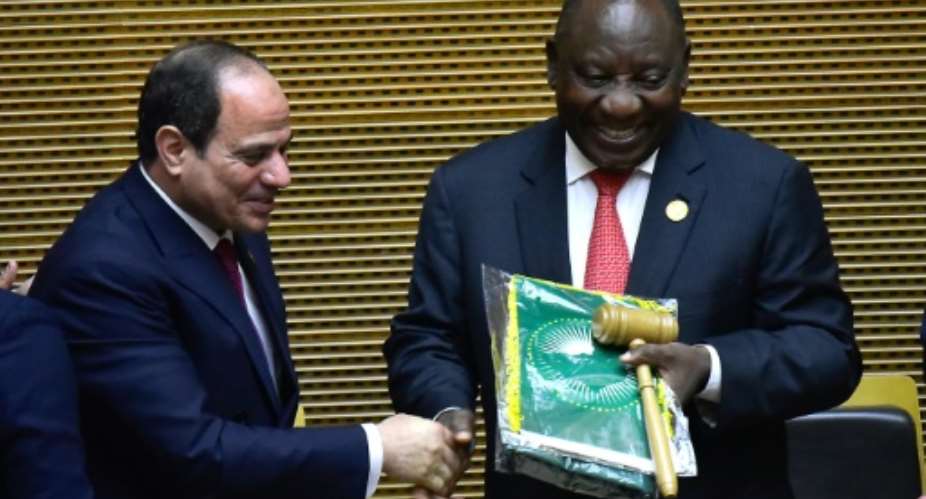African Union leaders vowed on Monday to push peace efforts in Libya, a sign of the bloc's desire to play a bigger role in resolving the continent's conflicts.
As the 55-member group wrapped up a two-day summit, Smail Chergui, the AU's Peace and Security Council chief, offered assistance to revive Libya's faltering UN-led peace process.
"It's (the) UN itself which needs us now," Chergui said.
"It's time to bring this situation to an end... the two organisations should work hand in hand for that goal," he added.
Libya has been torn by fighting between rival factions since a 2011 NATO-backed uprising killed dictator Moamer Kadhafi.
South African President Cyril Ramaphosa, who took over as AU chair on Sunday, has said Libya is one of two conflicts he wants to focus on during his tenure.
The other is South Sudan, where a civil war that began in 2013 has left hundreds of thousands dead -- but talks on the sidelines of the AU summit ended in deadlock.
Divisions and disagreements
The AU leadership has complained about being overlooked in Libya-related peacemaking efforts, which have been led primarily by the UN and heavily involved European nations.
UN Secretary General Antonio Guterres on Saturday said he understood the AU's "frustration" at having "been put aside" when it comes to Libya.
The North African state remains in chaos, mostly split between strongman Khalifa Haftar, who controls eastern Libya, and the UN-recognised government in Tripoli.
Talks between Libya's warring factions ended on Saturday with no deal on a ceasefire. The UN has proposed a second round of negotiations for February 18.
Chergui said the AU could support peace if a cessation of hostilities agreement is finally signed, declaring the AU wanted to be part of an observer mission to ensure any deal is respected.
"This is an African problem, and we have a certain sense that maybe others do not have," Chergui said.
Despite AU optimism, analysts are sceptical.
Observers pointed out that the AU will need to overcome financial constraints and political divisions if it wants to achieve its goal of "Silencing the Guns" -- the theme of summit talks.
"The AU will occupy the place that the protagonists of the conflict are willing to give it," said Mohamed Diatta, a researcher for the Institute for Security Studies.
"If these protagonists believe that the AU can provide the solution, they will turn to it, and it will not be up to the UN to decide that."
But the AU must overcome internal division to adopt a common position on Libya, he said.
"The AU bandwidth on Libya cannot in any way be compared to the UN's involvement, just in simple terms of knowledge and presence on the ground," said Claudia Gazzini, from the International Crisis Group (ICG) think-tank.
Tough line on S. Sudan
Meanwhile, on South Sudan, leaders tried to bring longtime rivals to reach a deal.
President Salva Kiir and rebel leader Riek Machar face a deadline of February 22 to form a unity government -- a milestone that was delayed twice last year.
Ramaphosa met separately with Kiir and Machar on Saturday, and the rivals sat down in the same room Sunday alongside Ugandan President Yoweri Museveni and Sudanese Prime Minister Abdallah Hamdok.
Hamdok is the current chair of the eight-member East African bloc IGAD, which has taken the lead in South Sudan peace negotiations.
But the flurry of activity on the sidelines of the AU summit did not result in a breakthrough in the dispute over the number of regional states in South Sudan -- a contentious issue as the borders will set out divisions of power and control in the young country.
IGAD said that despite the lack of progress to date there could be no more delays in forming a power-sharing government.
"Further extension is neither desirable nor feasible at this stage of the peace process," the statement said.





 Dr. Wiafe Akenteng: Over 3,000 cured of kidney disease by award-winning Ghanaian...
Dr. Wiafe Akenteng: Over 3,000 cured of kidney disease by award-winning Ghanaian...
 Do I have to apologise for doing my security work? I won’t – Simon Osei-Mensah t...
Do I have to apologise for doing my security work? I won’t – Simon Osei-Mensah t...
 Railway Minister Peter Amewu loses 94-year-old mother
Railway Minister Peter Amewu loses 94-year-old mother
 Prestea and Bogoso mines: Complete payment of outstanding salaries not later tha...
Prestea and Bogoso mines: Complete payment of outstanding salaries not later tha...
 NDC postpones Prof. Opoku-Agyemang entry tour to May
NDC postpones Prof. Opoku-Agyemang entry tour to May
 All my businesses have collapsed under Akufo-Addo — NDC Central regional chair
All my businesses have collapsed under Akufo-Addo — NDC Central regional chair
 Military, Prison Officers clash in Bawku, three injured
Military, Prison Officers clash in Bawku, three injured
 GRA-SML contract: MFWA files RTI request demanding KPMG report
GRA-SML contract: MFWA files RTI request demanding KPMG report
 Court threatens to call second accused to testify if NDC's Ofosu Ampofo fails to...
Court threatens to call second accused to testify if NDC's Ofosu Ampofo fails to...
 Family accuses hospital of medical negligence, extortion in death of 17-year-old...
Family accuses hospital of medical negligence, extortion in death of 17-year-old...
